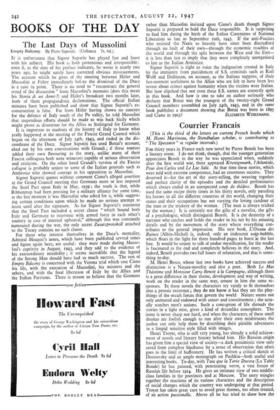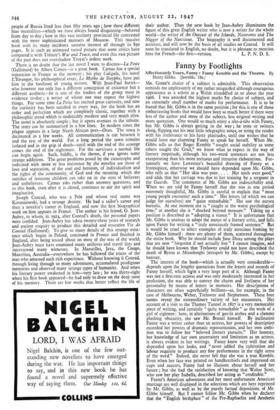Courrier Francais
(This is the third of the letters on current French books which M. Henri Martineau, the Stenclizalian scholar, is contributing to " The Spectator" at regular intervals.)
FOR thirty years in France each new novel by Pierre Benoit has been a literary event. I do not think, though, that the younger generation appreciates Benoit in the way he was appreciated when, suddenly after the first world war, there appeared Koenigsmark, Pour don Carlos and Le Lac Sale. At that time these stories, which were told with extreme competence, had an enormous success. They deserved it—for the art of the story-telling, the weaving together and perfect clarity of the episodes and the detailed preliminaries which always ended in an unexpected coup de theatre. Benoit has used the same recipe thirty times in his thirty novels, only parading his heroes in all the different countries of the world, changing their status and their occupations but not varying the loving candour of the man or the trickery of the woman. (The man is always tricked by the woman.) It is certainly not the gifts of a novelist, the gifts of a psychologist, which distinguish Benoit. It is the dexterity of a narrator who catches and holds the reader in his net by his amusing details and by the movement of the story where everything con- tributes to the general impression. His new book, L'Oiseau des Ruines (Albin-Michel) is, indeed, only an iridescent soap-bubble, which floats in the light for three hundred pages to burst at the last line. It would be unjust to talk of undue mystification, for the reader is fascinated to the end and completely believes in the story. And, indeed, Benoit provides two full hours of relaxation, and that is some- thing to-day.
M. Henri Bosco, whose last two books have achieved success and distinction is a Nature-novelist and also a poet. Both Le Mas Theotime and Monsieur Carre Benoit a la Campagne, although there is a great difference in their theme, development and way of writing, work on the reader in the same way, arouse in him the same re- sponses. In these novels the characters try vainly to fit themselves into a prosaic existence ; they do not know it but they are the play- things of the occult forces that govern the world. Nature seems not only animated and endowed with senses and consciousness ; she actu- ally watches men's actions. Such a conception of life shrouds the stories in a light mist, gives a kind of dreamlike atmosphere. The irony is never sharp nor hard, and when the characters of these small dramas are foolish enough to run after their own misfortunes the author can only help them by describing their pitiable adventures in a limpid sensitive style filled with images.
Henri Troyat, who is still very young, has already a solid achieve- ment of novels and literary history behind him. His Russian origin has given him a special view of society—a dark pessimistic view only saved from complete blackness by a sense of observation that often goes to the limit of buffoonery. He has written a critical sketch of Dostoevsky and an ample monograph on Pushkin—both useful and interesting books. To-day, with Tans que la Terre Durera (La Table Ronde) he has painted, with penetrating verve, a vast fresco of Russian .life before 1914. He gives an intimate view of two middle- class families in the provinces and at Moscow. The story mingles together the reactions of its various characters and the description of social changes which the country was undergoing at that period. Troyat has taken great care to avoid great themes, too often treated, of an action passionelle. Above all he has tried to show how the people of Russia lived less than fifty years ago ; how these different Slav mentalities—which we have always found disquieting—behaved from day to day ; how in this vast territory provincial life contrasted with the more sophisticated manners of Moscow. This massive book with its many incidents sustains interest all through its 850 pages. It is such an animated varied picture that some critics have compared it with Tolstoy's War and Peace, and even this vast picture of the past does not overshadow Troyat's ardent work.
There is no doubt that the last novel I want to discuss—La Peste (Gallimard) by Albert Camus—is a great book. Camus has a special reputation in France at the moment ; his play Caligula, his novel L'Etranger, his philosophical essay, Le Mythe de Sisyphe, have put him in the forefront of young writers. With Jean-Paul Sartre— who however not only has a different conception of existence but a different aesthetic—he is one of the leaders of the group most in evidence to-day ; a writer of whom one may expect the highest things. For some time La Peste has excited great curiosity, and now the curiosity has been satisfied in every way, for the book has an order and perfection which are completely classic, together with a philosophic trend which is undeniably modern and very much alive. The novel is absolutely simple ; but it opens avenues to the infinite. The story can be summarised in a few lines. In modern times the plague appears in a large North African port—Oran. The town is decimated in a few weeks. All communication is cut between it and the rest of the world. For a long period the town remains isolated and in the grip of death—until with the end of the scourge comes the end of the nightmare. For the survivors a normal life can begin again. Such, baldly, is the theme, if you ignore some strange additions. The great problems posed by the catastrophe and indicated with more or less insistence by the novelist are those of love and separation, of the soul and heroism, of individualism and the rights of the community, of God and the meaning which the sacrifice of innocent children can take on in the eyes of believers and unbelievers. Camus asks rather than answers questions, and so this book, even after it is closed, continues to stir the spirit and imagination.
Joseph Conrad, who was a Pole and whose real name was Korzeniowski, had a strange destiny. He had a sailor's career and then a novelist's career in England, and now the first biographical work on him appears in France. The author is his friend, G. Jean- Aubry, to whom, in 1924, after Conrad's death, the personal papers were confided. Jean-Aubry has taken twenty-three years of research and patient enquiry to produce this detailed and evocative Vie de Conrad (Gallimard). To give so many details of this strange exist- ence which began in Poland, continued in France and finished in England, after being tossed about on most of the seas of the world, Jean-Aubry must have examined many archives and travel lists and interviewed many witnesses. In Marseilles, Java, the Congo, Mauritius, Australia—everywhere he has followed the traces of the man who amassed such rich experience. Without knowing it Conrad, through living through so many adventures, accumulated prodigious memories and observed many strange types of humanity. And when his literary power awakened in him—very late ; he was thirty-eight when his first book appeared—he had only to draw on the deep store of his memory. There are few works that better reflect the life of
their author. Thus the new book by Jean-Aubry illuminates the figure of this great English writer who is now a writer for the whole world—the writer of An Outcast of the Islands, Nostromo and The Nigger of the Narcissus. The biography is well documented and accurate, and will now be the basis of all studies on Conrad. It will soon be translated in English, no doubt, but it is pleasant to mention
here the French—the first—version. L. P. N. D. S.



































 Previous page
Previous page